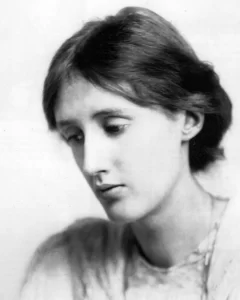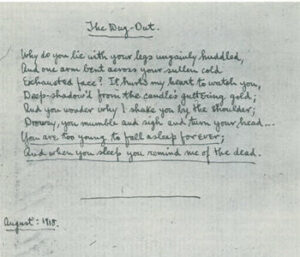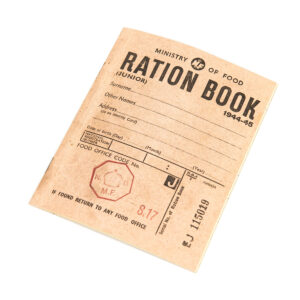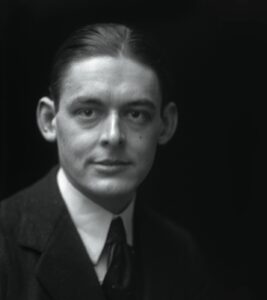How important was literature in the Second World War?
This winter, Summer and the team have been extremely busy in reorganising the Archive Libraries, to make it more accessible for future research! So today we are looking into literature in the First and Second World Wars.
How important was literature in the Wars?
During World War One, the war that was expected to be over by Christmas, was prolonged for four years of grim brutality of Trench warfare and advanced weaponry, including chemical weapons. The Horrors of the conflict altered the world for decades and many writers reflected that shifted outlook in their work. Virginia Woolf would later write,
“Then suddenly, like a chasm in a smooth road, the war came.”

Virginia Woolf portrait
Among the first to document the “chasm” of the war were the soldiers themselves. At first, idealism persisted as leaders glorified young soldiers marching off for the good of the country. English Poet known as Rupert Brooke, after enlisting in Britain’s Royal Navy, wrote a series of patriotic sonnets, including ‘The Soldier’. As time wore on, the war’s relentless horrors spawned darker reflections. Some, like poet Siegfried Sassoon, who saw it his duty to reflect the grim reality of the war in his work through poetry and declarations.

Sassoon’s handwritten poem, The Day Out
Sassoon
Sassoon wrote in his 1917 protest statement, ‘A Soldier’s Declaration’,
‘that the War is being deliberately prolonged by those how have the power to end it. I am a soldier, convinced that I am acting on behalf of soldiers. I believe this War, upon which I entered as a war of defence and liberation, has now become a war of aggression and conquest. I believe that the purposes for which I and my fellow-soldiers entered upon this War should have been so clearly stated as to have made it impossible for them to be changed without our knowledge, and that, has this been done, the objects which actuated us would now be attainable by negotiation.’[1]
This work was a catalyst for the change in opinion of many soldiers in the war, it was no longer a war of glory and conquest, it was a war of agony and aggression, through callous complacence. Throughout the years there was many different aspects of literature which were explored after the First World War.
WW2
The outbreak of war in 1939, as in 1914, ended an era of great intellectual and creative exuberance. Individuals were dispersed; the rationing of paper affected the production of magazines and books; and the poem and the short story, convenient forms for men under arms, became the favoured means of literary expression. It was hardly a time for new beginnings, although the poets of the New Apocalypse movement produced three anthologies (1940–45) inspired by Neoromantic anarchism[2].

Ration Book
No important new novelists or playwrights appeared. In fact, the well-grounded favourites during wartime known as Evelyn Waugh’s Put Out More Flags (1942), Henry Green’s Caught (1943), James Hanley’s No Directions (1943), Patrick Hamilton’s The Slaves of Solitude (1947), and Elizabeth Bowen’s The Heat of the Day (1949)—was produced by established writers. Only three new poets (all of whom died on active service) showed promise: Alun Lewis, Sidney Keyes, and Keith Douglas, the latter the most gifted and distinctive, whose eerily detached accounts of the battlefield revealed a poet of potential greatness. Lewis’s haunting short stories about the lives of officers and enlisted men are also works of very great accomplishment.

Photograph of T.S Eliot
It was a poet of an earlier generation, T.S. Eliot, who produced in his Four Quartets (1935–42; published as a whole, 1943) the masterpiece of the war. Reflecting upon language, time, and history, he searched, in the three quartets written during the war, for moral and religious significance during destruction and strove to counter the spirit of nationalism inevitably present in a nation at war. The creativity that had seemed to end with the tortured religious poetry and verse drama of the 1920s and ’30s had a rich and extraordinary late flowering as Eliot concerned himself, on the scale of The Waste Land but in a very different manner and mood, with the well-being of the society in which he lived.
[1] https://net.lib.byu.edu/english/wwi/influence/ssprotest.html
[2] https://www.eng-literature.com/2019/09/impact-of-world-war-ii-on-english-literature.html

